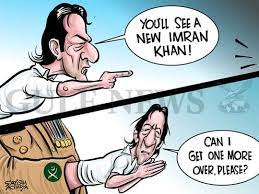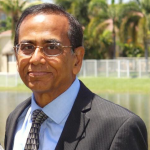
An important factor in Khan’s troubles is the apparent loss of military support. The relationship with the military began to sour in October when Khan resisted the army’s choice for a new head of the intelligence service.
Nazarul Islam
To understand why the Prime Minister of Pakistan, lovingly called Imran survived his short tenure, whizzing from one leadership crisis to another—is his intrinsic ability to treat politics, as the game of cricket. He always calculates his moves, perseveres, and then goes for the kill. To know why he wins his matches, is to know his struggles in the last fifty years, both on and off the cricket grounds.
Imran Khan was elected as Pakistan’s prime minister in 2018 when he ran as a nationalist promising to fight corruption, revive the country’s struggling economy and maintain an independent foreign policy that distanced Pakistan from the United States.
Born to an affluent family in Lahore and educated at Oxford University, Mr. Khan, 69, first rose to international prominence in the late 1970s on the cricket pitch and became a regular in London’s fashionable crowd. In 1995, he married a British heiress, Jemima Goldsmith.
A year later, Mr. Khan tried to parlay his popularity from cricket — he had led Pakistan in 1992 to its only World Cup triumph — into a political career, establishing his own party, Pakistan Tehreek-e-Insaf, or the Movement for Justice.
As a politician, he painted a picture of himself as a reformer offering an alternative to Pakistan’s entrenched political dynasties.
For over a decade, Mr. Khan had struggled to make political inroads and was mocked for his political ambitions. But by 2011, he began to gather political momentum, drawing hundreds of thousands of Pakistanis to his rallies. Many were energized by his populist, anticorruption and anti-American message.
By then, the former international playboy had embraced a pious form of Islam and sought to transform his personal image. In 2018, Mr. Khan got married for a third time, to his spiritual adviser, Bushra Bibi. (His marriage to Ms. Goldsmith had ended in divorce, and he was briefly married in 2015 to a broadcast journalist, Reham Khan.)
As good fortune is known to favor the brave, Imran emerged into Pakistan’s political realm and limelight in 2018. After winning the backing of military leaders, Mr. Khan became prime minister of a country that was on its way to the ventilators. Many of his rivals accused the military of manipulating the election in his favor — an accusation Mr. Khan and the military have both denied. He ushered in a new foreign policy, moving away from the United States and closer to Russia and China.
Mr. Khan’s relatively stable tenure began to unwind late last year, as dissatisfaction with his handling of the economy came to a head and a dispute with the military over its leadership appeared to cost him its support.
Throughout his 26 years in politics, Khan has shown himself willing to shape shift in pursuit of power. Despite his international image as a playboy and socialite, he embraced conservative Islam, earning him the local nickname “Taliban Khan” in reference to his overtures to religious hardliners.
In the 2013 election campaign, when Khan really began to gather mass support, he presented himself as an anti-corruption crusader – but in 2018, he gained important political backing from established, highly corrupt feudal politicians.
In opposition, he railed against the outsized role of the military in public life, saying the generals “just don’t have the vision to run the country”.
But his rise to political power in 2018 was widely attributed to military patronage. “Khan made a big deal out of being the outsider but his close relationship with the military establishment put a different gloss on his populism,” says an analyst.
Pakistan has been directly ruled by the military for roughly half of its 75 years, and Khan’s victory in 2018 was only the second transition from one democratically elected government to another.
However….that victory came amid drastically ramped-up censorship, with widespread allegations of military interference in favor of the PTI. During the election campaign, three news channels were taken off air by the regulator after broadcasting speeches by major opposition parties, while PTI rallies aired without problems. Every opposition party initially rejected his win, alleging vote-rigging.
Once he was in power, Khan did nothing to build bridges, instead jailing prominent opposition politicians – including his two predecessors, Nawaz Sharif and Asif Ali Zardari – on corruption charges. Khan has since presided over further crackdowns on free speech and political opposition. During his tenure, scores of journalists, activists and protesters, including a sitting member of parliament, have been arrested for sedition or under counterterrorism laws.
At rallies, Khan refers to the three main opposition parties as “the three stooges” or “three mice”. For most of Pakistan’s history, the two dynastic parties, the Pakistan People’s Party (PPP) and Pakistan Muslim League – Nawaz (PML-N), have been at loggerheads, but now they have formed an unlikely alliance, along with the Pakistan Democratic Movement (PDM), to oust Khan.
An important factor in Khan’s troubles is the apparent loss of military support, a dramatic change in political dynamics which has emboldened the opposition to strike now. Even when it is not in direct control of Pakistan, the army pulls strings behind the scenes, particularly on foreign policy and domestic security. “The military role was much more explicit and open than for any previous government,” analysts say. “Khan saw it as a source of strength, rather than weakness, and flaunted it.”
The relationship with the military began to sour in October when Khan resisted the army’s choice for a new head of the intelligence service. It is extremely unusual for a civilian politician to push back on army appointments.
The generals prevailed but concerns remained that Khan might try to place a loyal aide in charge of the army when the chief role comes up for renewal this year. “He is arrogant,” says Zia Ur Rehman, a Karachi-based journalist and researcher. “He tried to be something different than previous prime ministers, but this was a huge misjudgment.”
And so….Imran has paid his price, at least for now!
_________________
 The Bengal-born writer Nazarul Islam is a senior educationist based in USA. He writes for Sindh Courier and the newspapers of Bangladesh, India and America. He is author of a recently published book ‘Chasing Hope’ – a compilation of his articles.
The Bengal-born writer Nazarul Islam is a senior educationist based in USA. He writes for Sindh Courier and the newspapers of Bangladesh, India and America. He is author of a recently published book ‘Chasing Hope’ – a compilation of his articles.